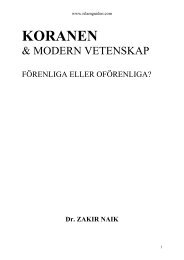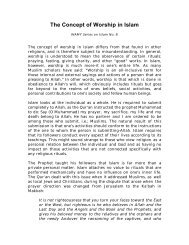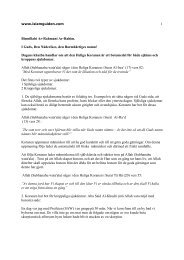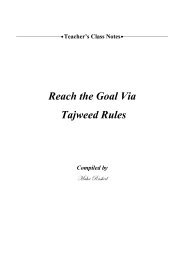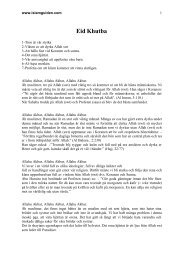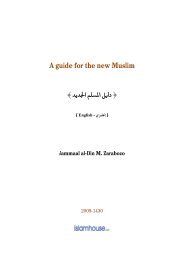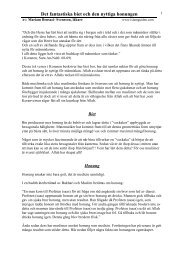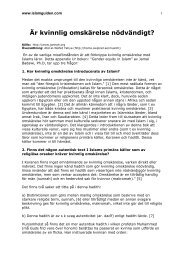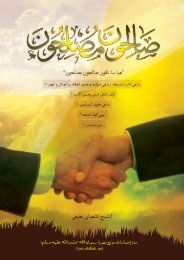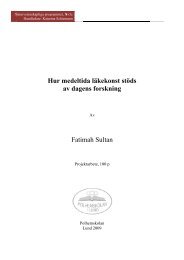The Prophet's Prayer From The beginning To The End As Though ...
The Prophet's Prayer From The beginning To The End As Though ...
The Prophet's Prayer From The beginning To The End As Though ...
Create successful ePaper yourself
Turn your PDF publications into a flip-book with our unique Google optimized e-Paper software.
He (i.e. Ibn Hajr), may Allaah benefit us with his life, was asked about the features of salaah on the Prophet (sallallaahu 'alaihi wa<br />
sallam), whether during prayer or outside it, compulsory or recommended: Is one of its conditions that the Prophet (sallallaahu<br />
'alaihi wa sallam) be attributed with sayaadah (leadership), e.g. 'O Allaah! send prayers on sayyidinaa (our leader) Muhammad ...'<br />
or 'the foremost of creation', or 'the leader of the children of Aadam' etc. Or should one stick to 'O Allaah! send prayers on<br />
Muhammad' Which of these two is the better approach: including the word sayyid, due to it being an established attribute of the<br />
Prophet (sallallaahu 'alaihi wa sallam), or leaving it out due to the absence of it in the narrations He (Ibn Hajr), may Allaah be<br />
pleased with him, replied: "Yes, to follow the narrated wording is superior. It cannot be said, "Maybe the Prophet (sallallaahu 'alaihi<br />
wa sallam) himself did not say it out of modesty, just as he did not say (sallallaahu 'alaihi wa sallam) on mention of his name,<br />
although his ummah has been encouraged to do so" - for we say that if that were superior, it would have been quoted from the<br />
Companions and then from the Successors, but we do not come across it in any narrations from any Companion or Successor. This<br />
is despite the volume of quotations from them. We have Imaam Shaafi'i, may Allaah exalt his rank, one of the foremost among men<br />
in his respect for the Prophet (sallallaahu 'alaihi wa sallam), saying in the preface to his book which is a base for the people of his<br />
madhhab: "O Allaah! send prayers on Muhammad ..." etc. until the end of what his judgment dictated, "... every time one of the<br />
rememberers remembers him, and every time one of the heedless fails to remember him", which he seems to have deduced from<br />
the authentic hadeeth which has in it that the Prophet (sallallaahu 'alaihi wa sallam) saw the Mother of the Believers engaging in<br />
long and numerous glorifications, so he said to her, "You have said words which, if weighed against the following, would be<br />
balanced: Glorified be Allaah, as many times as the number of His creation"; he (sallallaahu 'alaihi wa sallam) used to like<br />
supplications which were concise, but exhaustive in meaning. Qaadi 'Iyaad set out a chapter about salaah on the Prophet<br />
(sallallaahu 'alaihi wa sallam) in his book ash- Shifaa' (<strong>The</strong> Book of Cure), quoting in it narrations from the Prophet (sallallaahu<br />
'alaihi wa sallam) on the authority of several Companions and Successors; in none of these is the word sayyid reported:<br />
a) <strong>The</strong> hadith of 'Ali, that he used to teach them the manner of salaah on the Prophet (sallallaahu 'alaihi wa sallam) by saying, O<br />
Allaah, Spreader of Plains, Originator of Heights, send the foremost of Your prayers, the most fertile of Your blessings, and any<br />
remaining compliments, on Muhammad, Your slave and messenger, the opener of what is closed.<br />
b) Again from 'Ali, that he used to say, "<strong>The</strong> prayers of Allaah, the Beneficent, the Merciful, of the Angels nearest (to Allaah), of the<br />
Prophets, of the Sincere ones, of the Witnesses, of the Righteous, and of whatever glorifies You, O Lord of the Worlds, be on<br />
Muhammad son of 'Abdullaah, Seal of the Prophets, Imaam of the Godfearers, ... etc."<br />
c) On the authority of 'Abdullaah ibn Mas'ood, that he used to say, "O Allaah! send Your prayers, Your blessings and Your mercy, on<br />
Muhammad, Your slave and messenger, the imaam of goodness, the messenger of mercy, ..." etc.<br />
d) <strong>From</strong> al-Hasan al-Basri, that he used to say, "Whoever wants to drink from the cup which quenches, from the fount of the al-<br />
Mustafaa, should say: O Allaah! send prayers on Muhammad, and on his family, his Companions, his wives, his children, his<br />
descendants, his household, his in-laws, his helpers, his followers, and all those who love him." This is what he (Qaadi 'Iyaad) has<br />
written in ash- Shifaa', regarding the manner of salaah on the Prophet, on the authority of the Companions and those who<br />
succeeded them, and he also mentioned other things in it. Yes, it is related in a hadeeth of Ibn Mas'ood that in his salaah on the<br />
Prophet (sallallaahu 'alaihi wa sallam), he would say, "O Allaah! send the best of Your prayers, mercy and blessings on the leader<br />
(sayyid) of the messengers ..." etc., transmitted by Ibn Maajah, but its isnaad is weak, so the hadeeth of 'Ali, transmitted by<br />
Tabaraani with a acceptable isnaad, takes precedence. This hadeeth has difficult words, which I have reported and explained in the<br />
book Fadl an-Nabi (Excellence of the Prophet (sallallaahu 'alaihi wa sallam)") by Abul Hasan ibn al-Faaris. Some Shaafi'is have said<br />
that if a man took an oath to send the best salaah on the Prophet (sallallaahu 'alaihi wa sallam), the way to fulfil his oath would be<br />
to say, "O Allaah! send prayers on Muhammad every time the rememberers remember him or the heedless fail to remember him";<br />
Nawawi said, "<strong>The</strong> one which is most fitting to be designated as correct is that one should say: O Allaah! send prayers on<br />
Muhammad, and on the family of Muhammad, as you sent prayers on Ibraaheem ..." Several of the later scholars have replied to<br />
this by saying that in neither of the two ways mentioned above is there anything to prove which is superior as regards narration, but<br />
as regards the meaning, then the former is clearly superior. This issue is well-known in the books of fiqh, and of all the scholars of<br />
fiqh who addressed this issue, without exception, in none of their words does the word sayyid appear. Had this additional word been<br />
commendable, it would not have escaped all of them, leaving them ignorant of it. All good is in following what is narrated, and<br />
Allaah knows best."<br />
Ibn Hajr's view of the unacceptability of describing the Prophet (sallallaahu 'alaihi wa sallam) as sayyid during the salaah on him in<br />
accordance with the Qur'aanic order, is also that of the Hanafi scholars. It is the view which must be adhered to, for it is a true<br />
indication of love for him, (sallallaahu 'alaihi wa sallam);<br />
"Say: If you do love Allaah, then follow me: Allaah will love you." (aal-'Imraan 3:31)<br />
Because of this, Imaam Nawawi said in Rawdah at-Taalibeen (1/265), "<strong>The</strong> most complete salaah on the Prophet (sallallaahu 'alaihi<br />
wa sallam) is: O Allaah! send your prayers on Muhammad ..." etc., corresponding to type no. 3 given, in which there is no mention<br />
of sayyid!<br />
4) It should be known that types nos. 1 and 4 are the ones which the Messenger of Allaah (sallallaahu 'alaihi wa sallam) taught his<br />
Companions when they asked about the manner of salaah on him, so this has been used as evidence that these are the best ways of<br />
doing the salaah on him, for he would not choose anything for them or himself except the best and noblest. Imaam Nawawi, as<br />
mentioned, endorsed (in Rawdah at- Taalibeen) that if a man were to take an oath to do the best possible salaah on the Prophet<br />
(sallallaahu 'alaihi wa sallam), this could not be fulfilled except in these ways.<br />
Subki has given another reason: whoever does salaah with those types has made salaah on the Prophet (sallallaahu 'alaihi wa<br />
sallam) with certainty, and whoever does so with other words is in doubt whether or not he has performed the prayers as requested.<br />
This is because they said, "How do we send prayers on you" and he replied, "Say: ...", thus defining their salaah on him as their<br />
saying such-and-such. This was mentioned by Haitami in ad-Darr al-Mandood (25/2); he then said (27/1) that the objective is<br />
achieved with all the types which have occurred in authentic ahaadeeth.<br />
5) It should be known that it is not valid to combine all these way into one way of salaah, and the same goes for the different<br />
tashahhuds given previously. In fact, that would be an innovation in the religion; the Sunnah is to say different ones at different<br />
times, as Shaikh-ul-Islaam Ibn Taymiyyah has explained in his discussion of the takbeers of the two 'Eids (Majmoo' al-Fataawaa<br />
29/253/1).<br />
٥٥



